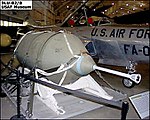
American aircraft conducted extensive bombing campaigns during the conflict, such as here during Operation Rolling Thunder
The American air campaign during the Vietnam War was one of the largest in military history. The US contribution to this air-war was the largest. Chief of Staff of the United States Air Force Curtis LeMay stated that "we're going to bomb them back into the Stone Age".[1] However Chinese, Southern Vietnamese and North Vietnamese aircraft also utilised a range of bombs and fought back against the American forces. Weapons from both sides contribute to the below list of bombs in the Vietnam war.
On March 2, 1965, following an attack on a U.S. Marine barracks at Pleiku, Operation Flaming Dart and Operation Rolling Thunder commenced. The bombing campaign, which ultimately lasted three years, was intended to force North Vietnam to cease its support for the NLF by threatening to destroy North Vietnam's air defenses and industrial infrastructure. As well, it was aimed at bolstering the morale of the South Vietnamese.[2] Between March 1965 and November 1968, "Rolling Thunder" deluged the north with a million tons of missiles, rockets and bombs.[3] Bombing was not restricted to North Vietnam. Other aerial campaigns, such as Operation Commando Hunt, targeted different parts of the NLF and PAVN infrastructure. These included the Ho Chi Minh Trail, which ran through Laos and Cambodia. The objective of forcing North Vietnam to stop its support for the NLF, however, was never reached.
USAF/USN/VNAF[]
The United States Air Force, United States Navy and their South Vietnamese allies, the Vietnamese Air Force, fielded a large array of technologically advanced ground attack and bomber aircraft. These included the *Douglas A-1 Skyraider carrier borne propeller driven dive bomber, the Cessna A-37 Dragonfly, the Northrop F-5 Freedom Fighter, Douglas A-4 Skyhawk carrier borne light attack plane, Grumman A-6 Intruder carrier borne all weather medium bomber and Ling-Temco-Vought A-7 Corsair II carrier borne ground attack plane; the General Dynamics F-111 Aardvark Fighter/Bomber, the Boeing B-52 Stratofortress heavy bomber, Martin B-57 Canberra medium bombers and the English Electric/GAF Canberra B.20 medium bomber. This vast variety of ground attack aircraft used a large number of bombs.
Dumb bombs[]
- Mk-81
- CBU-55
- Mk-77
- Mk-82
The Mk-82
- Mk-82 HDGP
- Mk-82 500 LB Bomb
- Mk-83[4]
- Mk-84

The Mk-84
- Mk-15
- Mk-20 Rockeye (CBU-100 Cluster Bomb)
- Mk-22
- Mk-38

The MK38 bomb
- Mk-117
- Mk-118
- BLU-82 Daisy cutter

A Daisy Cutter
Guided bombs[]
- AGM-62 Walleye
- BLU-3 Pineapple

A BLU-3 Pineapple Cluster Bomblett
- BLU-18
- BLU-17/B
- BLU-26/B
- BLU-24/B
- BLU-36/B
- BLU-66/B
- BLU-59/B
- BLU-61A/B
- BLU-63/B
- BLU-77/B
- BLU-24/B
- BLU-85/B
- BLU-86/B
- BOLT-117
- GBU-10
- GBU-15
- GBU-12 Paveway II
- GBU-27 Paveway III
Fuel Air Explosives[]
China/North Vietnam[]
The North Vietnamese Air Force in contrast fielded only a small number of aircraft on limited, largely unsuccessful roles. The majority of them were fighter jets, with limited ground attack capability. These included the MiG-21 jet fighter, the MiG-19 jet fighter, the MiG-17 jet fighter, the MiG-15 jet fighter, and the smaller AN-2 aircraft.
Big ball bombs[]
Fuel Air Explosives[]
- 500 kg napalm
See also[]
Notes[]
- ↑ Gen. Curtis E LeMay
- ↑ Earl L. Tilford, Setup: What the Air Force did in Vietnam and Why. Maxwell Air Force Base AL: Air University Press, 1991, p. 89.
- ↑ Karnow Vietnam: A History p. 468.
- ↑ Frankum, p. 22.
- ↑ The World Book Encyclopedia, p. 450.
- ↑ Aerospace Mig-21 retrieved November 12, 2007
- ↑ Vietnamese Aces retrieved November 12, 2007
References[]
Printed sources:
- Frankum, R. B. Like Rolling Thunder: The Air War in Vietnam, 1964—1975, 2005 ISBN 0-7425-4302-1
- World Book, Inc. (ed.) The World Book Encyclopedia, 2000 ISBN 0-7166-0100-1
Websites:
- Aerospace Mig-21 retrieved November 12, 2007
- PBS Weapons of the Vietnam War retrieved November 11, 2007
- Vietnamese Aces retrieved November 12, 2007
The original article can be found at List of bombs in the Vietnam War and the edit history here.




